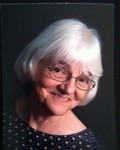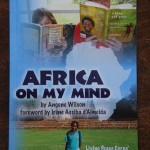Talking With Angene Wilson (Liberia 1962-64) Author of Africa on My Mind: Educating Americans for Fifty Years, Living Peace Corps' Third Goal
Where were you a PCV and what were your years and assignment?
I was a PCV in Liberia I from 1962 to 1964, teaching junior high and high school social studies at Suehn Industrial Academy, a mission boarding school run by African American missionaries.
Tell us a little about your background.
I grew up in Lakewood, Ohio, a suburb of Cleveland, and got my BA in History at the College of Wooster, also in Ohio. I got my MA in History and African Studies at Michigan State after my Peace Corps service and my PhD in Humanities Education at Ohio State after our tours in Sierra Leone and Fiji where my husband Jack was Associate and then Peace Corps Director and where I taught in teacher training colleges.
You joined the Peace Corps with your husband?
Well, yes, my future husband. We applied in March 1961 when we, Jack and I, were seniors in college, engaged to get married. We joined because we wanted to serve as Kennedy asked, because of the adventure, the chance to travel. We didn’t know how much we would learn!
What was your more ‘telling moment’ in the Peace Corps?
On November 23, 1963 we stopped at a gas station outside Monrovia to fill up the Peace Corps jeep to return to our site. The gas station attendant said, “Our president has been shot and killed.” He meant Kennedy not Tubman, the president of Liberia. We listened to VOA all weekend in rapt disbelief. On Monday there was no school; Jack gave the eulogy at a memorial service. In Monrovia the Liberian president presided over a memorial service and declared a month of mourning. Liberians and other Africans saw Kennedy as the first president who cared about the continent and its people.
When did you decide to write this book and why?
I decided to write Africa on My Mind: Educating Americans for Fifty Years, Living Peace Corps’ Third Goal several years ago, actually as our book Voices from the Peace Corps: Fifty Years of Kentucky Volunteers was being published by University Press of Kentucky. In that book we had woven together stories from 100 oral history interviews to illustrate the life cycle of the PCV from why we went through the PCV experience to citizens of the world for the rest of our lives. The epilogue was our story. But I had written about Africa for 50 years in poetry, essay, short story, magazine article, journal, plus two books (The Meaning of International Experience for Schools and, with RPCV Sierra Leone Merry Merryfield, Social Studies and the World: Teaching Global Perspectives) and many academic articles as a teacher education professor. Perhaps it was the conceit and extravagance of old age! I just turned 75! I wanted to pull together in one place at least excerpts of what I had written on my journey of learning and teaching and still learning and still teaching about Africa. You suggested, John, that I add elements of a memoir and I did those as transitions between the pieces I had written over the years.
How would you describe your book?
Africa on My Mind: Educating Americans for Fifty Years, Living Peace Corps’ Third Goal is part anthology, part memoir focused on bringing the world back home. It begins with a poem sent home in a letter in 1963 about a trip upcountry in Liberia, a second poem entitled “Why Am I Here?” written for my college alumni magazine, and articles published in The Christian Century, Africa Report, and Negro History Bulletin in the 1960s. Short stories, academic article excerpts, and teaching ideas illustrate my 50 year journey of learning and sharing, especially in my profession as a teacher educator. Two of my favorites: “Ahmadu’s Lorry,” a children’s story set in Sierra Leone, and “A Cross-National Conversation about Teaching from a Global Perspective” with my colleague, Yao Quashigah, from my Fulbright  experience in Ghana in 1997.
experience in Ghana in 1997.
What Peace Corps writers have you read?
I particularly appreciate Peter Hessler’s books about China and his writing now from Egypt. He focuses on people and history, connecting those to current affairs. I like Kris Holloway’s Monique and the Mango Rains because it focuses on a Malian midwife. In contrast and not surprisingly, most of Peace Corps memoir writing focuses on ourselves. I have always read and still read lots of African writers, from Achebe to Adiche, from Soyinka to Selasi. Africans can do most of the educating of Americans now, as I conclude in Africa on My Mind.
Angene, thank you for your book on Liberia and those early years of your life.
Thanks you, and thank Marian Beil for her help and support.
Oh my…this is just what I needed, thanks John for having Angene share her thoughts and messages from her Africa. We all heard the call, no President had reached out to us as JFK did…and life has not been the same since…right Angene? But now I see new Volunteers that could be my grandchildren…and they have the same spark of the 60’s, and a desire to “listen and learn” as we did. And these young PCV’s are staying an extra year or more…the Peace Corps bug has bitten them, I see it in their eyes. I wish you well, ever consider becoming a Peace Corps Response Volunteer for a short term? I did at 71 and that was over five years ago…now I am in Panamá. I wish you well, Bob